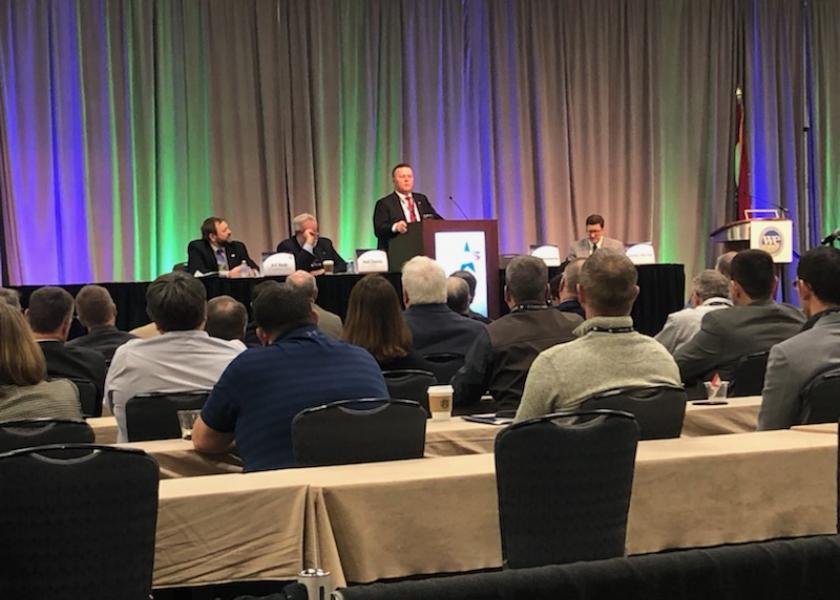ASF Prevention Tops Resolutions Passed by NPPC

Each year, pork producers meet to discuss pork industry challenges and opportunities and adopt resolutions to help protect the U.S. pork industry during the the National Pork Producers Council's (NPPC) annual meeting at the National Pork Industry Forum,
NPPC delegates adopted several important resolutions during the meeting held March 4-6 in Kansas City, Mo.
Key areas include:
- Strengthen efforts to prevent African swine fever (ASF), a deadly virus that impacts pigs only, and other foreign animal diseases from entering the U.S. Separate resolutions were adopted directing NPPC to encourage federal regulatory agencies to investigate the risks of imported pet food and pet products containing pork from foreign animal disease-positive countries; take a position on feeding hogs from plate waste; and support and advance responsible import policies to safely introduce essential feed ingredients from high-risk countries.
"The responsible import policies resolution is based on relatively new science," explains Scott Dee, DVM, director of research for Pipestone Veterinary Systems. "It's important that we really educate producers at all levels about the science of viral transport and transmission in feed in order to organize a critical mass of responsible import practices across the country."
- Advocate for accurate and truthful labeling of plant-based and cell-cultured products, while supporting enforcement of fair labeling by the FDA and USDA. NPPC encourages consumer choice and welcomes competitive markets. Plant-based and cell-cultured products designed to mimic real meat must face the same stringent regulatory requirements as livestock agriculture, including truthful labeling standards.
- Support reauthorization of and increased export data transparency in the Livestock Mandatory Reporting Act (LMRA), which provides information on the marketing of cattle, swine, lambs and products from those animals. Twice daily mandatory price reports published by USDA include information on pricing, contracting for purchase, supply-and-demand conditions for livestock, livestock production and livestock products. LMRA is set to expire on Sept. 30.
"Pork producers need a transparent, accurate and timely national market reporting system to make knowledge-based business decisions about selling their hogs," says Jen Sorenson, NPPC vice president and communications director for Iowa Select Farms. "Mandatory Price Reporting offers market information on pricing, contracting for purchase and supply-and-demand conditions for hogs, all of which enhance market transparency. NPPC supports timely reauthorization of the Livestock Mandatory Reporting Act. This is an important priority for us this year."
In addition, delegates passed a resolution reaffirming plans to increase the contribution rate of NPPC's strategic investment program from 10 cents to 20 cents per $100 of hogs marketed, effective July 1, 2021.
"These resolutions reflect the priorities that will help shape the future of the U.S. pork industry," NPPC President David Herring, a hog farmer from Lillington, N.C. said in a release. "NPPC will work with Congress, the administration and others to address these vital issues for American hog farmers."
More from National Pork Industry Forum:
USDA Unveils Action Plan to Protect the U.S. Pork Industry from ASF
Pig Farmers Fight Food Insecurity in Kansas City with Pork Donation
Trust and Value Guide Direction of Pork Checkoff in 2020
Pork Industry Inducts Everett Forkner into NPPC Hall of Fame
Bret Marsh Receives National Pork Board's Distinguished Service Award
Texas Pork Producers Association Former Executive Wins National Award







